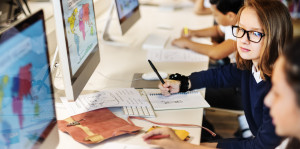The transition from normal life to refugee status is often sudden, violent and filled with dread. In a matter of hours, people forced to flee conflict and persecution can lose everything: their homes, their land, their possessions, their friends and even their families.
But for child refugees the loss of an education can prove to be a life-long hardship. The impact of missing out on school can rob them of opportunities throughout their lives.
According to the United Nations High Commission for Refugees, there are 65 million people displaced by war, violence and persecution. Having fled their homes with meagre possessions, many young refugees never find their way back into the classroom.
One of the regions where this is particularly true is the Middle East and North African (MENA) region, where millions have fled the war in Syria and instability in Iraq and Yemen.
The MENA region suffers a paradox of having invested heavily in information technology and communications but not having enough skilled workers to power the digital economy.
Refugees are often in desperate need of finding a way to rebuild their lives and find paid work wherever they ultimately end up living. Training refugees in coding may be one way of helping them support themselves financially, while also filling the digital skills gap.
Skills for life
Inside refugee communities across the MENA region, children and young adults have been learning digital skills that could transform their future.
For one week during October 2016, more than 10,000 young refugees living in Turkey, Lebanon, Jordan and Egypt were taught the basics of computer programming. In 2017, more than 13,000 young refugees benefitted.
The initiative, called Refugee Code Week, gave the younger refugees, aged between 8 and 14, an introduction to coding, designed to ignite their interest in the subject.
Older age groups - between the ages of 18 and 25 - were given the opportunity to join a bootcamp up to 20 weeks long. The idea was that this would provide them with enough knowledge to take on a job as either software engineer or web developers.
The initiative was launched following an urgent call by the UNHCR for the private sector to help with the refugee crisis by providing increased employment opportunities and ways to facilitate their education.
In response, software and technology solutions company SAP launched Refugee Code Week, in collaboration with the UNHCR and Galway Education Center.
“It’s critical to digitally empower youth,” explains Batoul Husseini (Director Corporate Social Responsibility, SAP Middle East and North Africa). “Even as early as 8 years old, they need to learn critical coding skills to build a better future.
“The beauty is that, once they have learned how to do it, they can continue to learn by themselves. It’s a bit like Lego, teach them how to put the pieces together and they can build on that knowledge.
“Also, when acquiring advance, job-relevant technical and soft skills these young people can work remotely in these jobs, means that the initiative is really helping entire families.”
Expanding its reach
Although originally launched in response to the refugee crisis, the initiative has since been rebranded as Digital Skills for Today, given the scope of its work helping a wide range of people.
“Our vision is to digitally empower youth, refugees as well as minority populations around conflict zones, but to do that for a wider population as well,” explains Husseini.
“For example, making sure the programme is attractive for girls and boys alike.
“From the beginning, we were also supporting the national education systems in the countries affected by the refugee crisis,” she adds. “The digital skills gap is a major issue in the region and given this is the 21st century and technology is driving the future of work, digital literacy is a necessary criteria for participation in the 4th industrial revolution.”
Digital Skills for Today is a year-round initiative, and one that responds to the needs of the market.
“The content of every cohort is very much market-driven,” says Husseini, explaining that non-technical skills are sometimes needed as much as technical ones.
“Students learn negotiation tactics, conflict resolution, self-management, and public speaking,” she explains. “These are the kinds of skills that employers are looking for.”
The project sees itself as a long-term venture and is now working on a sustainable model that is scalable. And its value to individuals will continue even if they are able to return to their home country.
“For refugees, they will be able to leapfrog their situation. It’s really important to move them rapidly into a more stable status and more specifically, to be able to return to their war-shattered countries and be able to contribute and put their countries back together,” she says.

